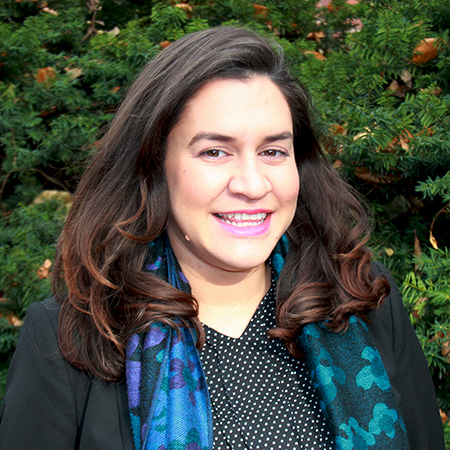Maria Alcívar Zúñiga
Maria Alcívar Zúñiga plans to work as a U.S. domestic policy director in the future. When Maria isn’t studying, she enjoys reading, playing soccer, and going on dates with her husband.
Get to know Maria
- Program: Human development and family studies
- Year: 5th year Ph.D.
- Hometown: West New York, New Jersey / Ecuador
- Career goal: United States domestic policy director
- Clubs/activities: Latin@ Graduate Student Association, Ames Interfaith Sanctuary Parters (ASIP), League of United latin American Citizenss (LULAC, Council 306)
- Awards/honors: Mid-Iowa Health Foundation HealthConnect Fellowship 2018, Helen LeBaron Hilton Fund, Martin Luther King Jr. Advancing One Community Award, Student Change Agent Award, 2020 American Colleges and Universities Patricia Cross Future Leaders Award
- Most influential ISU mentor: Tera Jordan
- Favorite class: HD FS 607, Mixed Methods Research
- Why Iowa State: Assistantship with the Child Welfare Research Training Project
Maria Alcívar Zúñiga researches impact of policy on immigrant families, aims to better inform policymakers
Maria Alcívar Zúñiga aims to use her research at Iowa State University and personal experiences with immigration to change U.S. policies.
Maria was born in Ecuador and came to the U.S. on a Visa with her family. Eventually, they overstayed their Visa and lived undocumented. Maria’s mother now has residency, her brother is a part of DACA, and Maria has her citizenship, but getting to this point was no easy task.
“The system doesn’t help families even if they have been here a long time,” she said.
Maria went through college undocumented. After earning her bachelor’s degree, she knew she needed her citizenship so she could continue her studies, use her education to help families in situations similar to hers, and research where the system and society fail them.
Now in the fifth year of her doctoral studies, Maria approaches her dissertation research with a human and family focus. Her research centers around how families navigate the immigration system — how living around the current policies mentally and physically affect them. She looks into the “toxic stress” that is especially apparent in children in immigrant families, and how they cope with it alongside other daily stressors.
“I’m familiar with the [immigration] system in general and the interior immigration enforcement policies,” she said. “I’m trying to analyze more of the resiliency of immigrant families, and their regenerative power in that context.”
Maria received a fellowship from the Mid-Iowa Health Foundation to support her research and advocacy efforts. She will also be using this opportunity to create educational material for Iowa legislators and service providers.
To start, Maria plans to share her research findings with legislators who can enact change through policies so immigrant families can have more chances to thrive. Becoming a domestic policy director for the U.S. is Maria’s end goal — a role in which she knows she can, and plans to, make a colossal impact.
“There’s a disconnect between research and policy,” she said. “Policymakers are not using the resources that exist; there’s already a lot of research done about how immigration policy affects immigrant families negatively, particularly U.S. citizen children. It’s my goal to raise awareness about this and try to get legislators to pay attention to the research that exists.”
Student Spotlights
